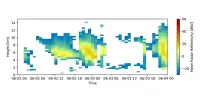AI voice coaching has shown promise as a potential tool for assisting people suffering from depression and anxiety. Because of its potential to provide accessible and personalized support, the use of artificial intelligence in mental health care has gained traction.
After using Lumen, researchers discovered changes in patients’ brain activity as well as improved depression and anxiety symptoms. According to the findings of a new pilot study led by University of Illinois Chicago researchers, artificial intelligence could be a useful tool in mental health treatment.
The first study to test an AI voice-based virtual coach for behavioral therapy discovered changes in patients’ brain activity as well as improved depression and anxiety symptoms after using Lumen, an AI voice assistant that delivered a type of psychotherapy.
According to the UIC team, the findings, which were published in the journal Translational Psychiatry, provide encouraging evidence that virtual therapy can help fill gaps in mental health care, where waitlists and disparities in access are frequently obstacles that patients, particularly those from vulnerable communities, must overcome in order to receive treatment.
We’ve had an incredible explosion of need, especially in the wake of COVID, with soaring rates of anxiety and depression and not enough practitioners. This kind of technology may serve as a bridge. It’s not meant to be a replacement for traditional therapy, but it may be an important stop-gap before somebody can seek treatment.
Dr. Olusola A. Ajilore
“We’ve had an incredible explosion of need, especially in the wake of COVID, with soaring rates of anxiety and depression and not enough practitioners,” said Dr. Olusola A. Ajilore, UIC professor of psychiatry and co-first author of the paper. “This kind of technology may serve as a bridge. It’s not meant to be a replacement for traditional therapy, but it may be an important stop-gap before somebody can seek treatment.”
Lumen, which is available as a skill in the Amazon Alexa app, was created by Ajilore and study senior author Dr.Jun Ma, the Beth and George Vitoux Professor of Medicine at UIC, along with collaborators from Washington University in St. Louis and Pennsylvania State University, with funding from the National Institute of Mental Health.
Over 60 patients were recruited by the UIC researchers for the clinical study, which looked at the application’s effect on mild-to-moderate depression and anxiety symptoms, as well as activity in brain areas previously linked to the benefits of problem-solving therapy.

Two-thirds of the patients used Lumen on a study-provided iPad for eight problem-solving therapy sessions, with the rest serving as a “waitlist” control receiving no intervention.
When compared to the control group, study participants who used the Lumen app after the intervention had lower levels of depression, anxiety, and psychological distress. The Lumen group also improved their problem-solving abilities, which were associated with increased activity in the dorsolateral prefrontal cortex, a brain area associated with cognitive control. There were also encouraging results for women and underrepresented groups.
“It’s about changing the way people think about problems and how to address them, as well as not being emotionally overwhelmed,” Ma explained. “It’s a well-established pragmatic and patient-driven behavior therapy, which makes it a good fit for delivery via voice-based technology.”
The researcher is currently conducting a larger trial comparing the use of Lumen with both a control group on a waitlist and patients receiving human-coached problem-solving therapy. They emphasize that the virtual coach does not need to outperform a human therapist in order to meet a critical need in the mental health system.
“The way we should think about digital mental health services is not for these apps to replace humans, but rather to recognize the gap between supply and demand and then find novel, effective, and safe ways to deliver treatments to individuals who would otherwise not have access,” Ma said.
















